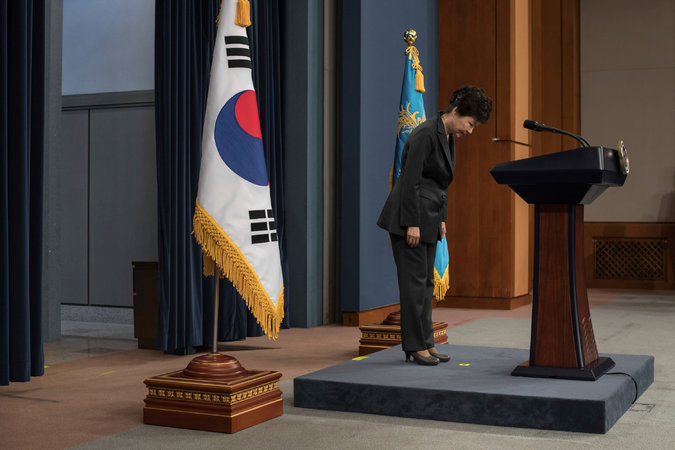- South Korea Parliament Votes to Impeach President Park Geun-hye
SEOUL, South Korea — South Korea’s Parliament voted on Friday to impeach President Park Geun-hye, an aloof conservative who took a hard line against North Korea and rose to power with strong support from those who revered her father, the military dictator Park Chung-hee.
The vote against Ms. Park, the nation’s first female leader, followed weeks of damaging disclosures in a corruption scandal that has all but paralyzed the government and produced the largest street protests in the nation’s history. Her powers will now be suspended as the Constitutional Court considers whether to remove her from office.
Ms. Park has been accused of allowing a shadowy confidante, the daughter of a religious sect leader, to exercise remarkable influence on matters ranging from choosing top government officials to her wardrobe, and of helping her extort tens of millions of dollars from South Korean companies. The scandal, which gained national attention less than two months ago, has cast a harsh light on collusion between the presidency and big business in one of Asia’s most dynamic economies.
A total of 234 lawmakers voted for impeachment, well over the required two-thirds threshold in the 300-seat Parliament. The vote was by secret ballot, but the outcome indicated that nearly half of the 128 lawmakers in Ms. Park’s party, Saenuri, had joined the opposition in moving to oust her.
Parliament’s motion for impeachment, accusing Ms. Park of “extensive and serious violations of the Constitution and the law,” will now be taken up by the Constitutional Court, which has six months to decide whether the charges are true and merit her ouster.
Prime Minister Hwang Kyo-ahn, a former prosecutor and staunch defender of Ms. Park, will serve as acting president in the meantime. If the court votes to remove Ms. Park, South Korea will hold an election for a new president in 60 days.
The political turmoil ushers in a period of uncertainty as South Korea faces a slowing economy, a growing nuclear threat from North Korea and a more assertive China. Ms. Park had adopted a tough stance toward the North, focusing on stronger sanctions, and had agreed to deploy an American advanced missile defense system that infuriated the Chinese.
Her unpopularity increases the chances of a liberal candidate winning the next election, possibly upending her North Korea approach and steering the country closer to China.
Domestically, her undoing provides the latest example of how corruption and influence-peddling remain entrenched at the top echelons of political and corporate life in South Korea.
The nexus of industry and political power has fueled South Korea’s transformation from a war-torn agrarian country into a global economic powerhouse, yet the ties between government and business have yielded recurring corruption scandals.
Ms. Park, 64, came to power in early 2013, backed mostly by older Koreans who had hoped she would be a contemporary version of her father, often viewed as the modernizer of South Korea.
Instead, she became the least popular leader since the country began democratizing in the late 1980s, according to recent polls. Critics said she was authoritarian and used state power to muzzle critics while shielded by a coterie of advisers.
The vote for impeachment in the National Assembly, South Korea’s Parliament, was a victory both for the opposition and the huge crowds of South Koreans who filled central Seoul for the past six weekends demanding that she resign immediately or face impeachment. Recent surveys showed that a vast majority of South Koreans agreed with the demonstrators.
“It is a victory of the people’s will and Korea’s democracy,” said Kang Won-taek, a professor of political science at Seoul National University. “It is Korea’s glorious revolution, achieved without blood and without any serious violence.”
The last time South Koreans took to the streets to kick out an unpopular leader, in 1960, they had to fight bloody battles with police officers armed with rifles.
That uprising forced Syngman Rhee, the country’s founding and authoritarian president, to resign and flee into exile in Hawaii. Vice President Lee Ki-poong, a Rhee confidant who was at the center of a corruption scandal, and his family ended their lives in a group suicide as mobs approached their home in Seoul.
In subsequent decades, when South Koreans demanded more democracy, their military dictators, including Ms. Park’s father, brutally suppressed them through martial law, torturing and even executing their leaders.
In 1987, violence erupted again as people took to the streets to demand free presidential elections, forcing the military government to back down.
This time, in a sign of how far South Korea’s democracy has matured, peaceful crowds achieved their goal without a single arrest. Increasingly large numbers of protesters gathered in the capital, including about 1.7 million people on Saturday — the largest protest in South Korean history.
The protesters sang and danced to rock music and put flower stickers on police buses. They marched, some pushing baby carriages, while uniformed officers stood aside. And they neared Ms. Park’s presidential compound, chanting that she should step down immediately or face impeachment.
Ms. Park became the first South Korean president to suffer such a fate since 2004, when the National Assembly moved to impeach Roh Moo-hyun for violating election law. Two months later, the Constitutional Court ruled that Mr. Roh’s offense was too minor to justify impeachment and restored him to office. But Ms. Park faces much more serious accusations.
Still, it is difficult to predict when and how the Constitutional Court will rule on Ms. Park’s fate. The process will buy time for Ms. Park’s embattled party to recover from the scandal and prepare for the next presidential election if the court decides to formally unseat her.
If a liberal candidate wins the next election, the plan for the American missile deployment could be in trouble. Although none of the politicians cited as potential presidential candidates has specified that they would reverse the plan if elected, liberals have criticized the deployment, saying that South Korea should pursue a more balanced diplomacy between Washington and Beijing.
That may present a challenge for the incoming administration of Donald J. Trump, as he deliberates over whether to adjust Washington’s approach toward North Korea’s advancing nuclear-missile program.
Ms. Park joins the ranks of South Korean leaders who have been disgraced near the end of their terms, with their relatives or aides implicated in corruption scandals. An exception was Ms. Park’s father, who was assassinated in 1979 at the height of his dictatorial power and before anyone dared to bring corruption charges against him.
His and subsequent governments had favored a handful of family-owned conglomerates with tax benefits, lucrative business licenses and buy-Korea and anti-labor policies. In return, the businesses were accused of returning the favors with bribes and suspicious donations.
Through the years, top corporations have been rocked by recurring corruption scandals, including the one that implicated Ms. Park and her confidante, Choi Soon-sil.
In 1988, business tycoons were hauled into a parliamentary hearing to be questioned about millions of dollars they gave to a foundation controlled by the military dictator Chun Doo-hwan.
The scene repeated this week, when nine business leaders, including Jay Y. Lee, the vice chairman of Samsung, and Chung Mong-koo, the Hyundai chairman, appeared at another parliamentary hearing to be questioned about millions of dollars they gave to two foundations controlled by Ms. Choi.
Ms. Choi has been indicted on charges of leveraging her influence with Ms. Park to extort the money from the businesses. Prosecutors have also identified Ms. Park as a criminal suspect, a first for a president, though she cannot be indicted while in office.
The businessmen admitted giving the money, confirming that the requests had come directly from Ms. Park or her aides.
Hur Chang-soo, chairman of GS Group and the head of the Federation of Korean Industries, the pro-business lobby group that coordinated the donations, put the situation this way: “It is difficult for businesses to say no to a request from the government. That’s the reality in South Korea.”
NY Times


 Forex3 weeks ago
Forex3 weeks ago


 Naira2 weeks ago
Naira2 weeks ago
 Billionaire Watch2 weeks ago
Billionaire Watch2 weeks ago




 Naira2 weeks ago
Naira2 weeks ago




 Naira2 weeks ago
Naira2 weeks ago




 Naira1 week ago
Naira1 week ago




 Naira4 weeks ago
Naira4 weeks ago




 Naira3 weeks ago
Naira3 weeks ago





















